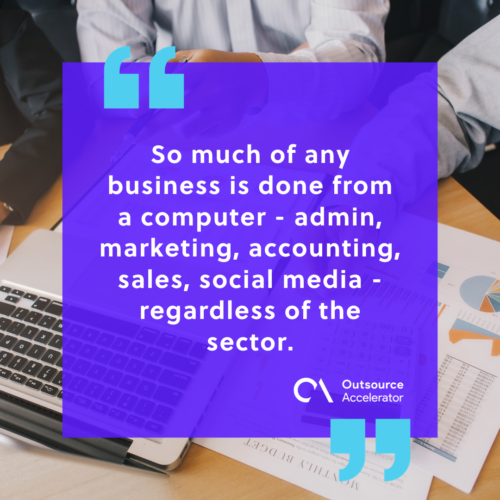Welcome back! If you ever ponder the future of work and employment, then you’re in the right place. We’re your captain, navigating you through the choppy seas and fast winds of change.
What jobs can’t be offshored?
People often ask, ‘what jobs can be offshored?’
My default answer is: 99% of jobs across 99% of industries. While that might be a bit hyperbolic, it’s not far off.
Let’s unpack that a bit.
It’s true that 99% of businesses use computers to do their work. Not too long ago, there weren’t any computers – or internet – and now they’re everywhere. So the ‘way we work’ has dramatically shifted in the last few decades.
Why does it matter if businesses use a computer or not? Because if the work can be done on a computer, then basically, it can be done offshore.
Many roles still exist that cannot use a computer – like plumbers, bakers, hairdressers, nurses, etc. However, the broader activities of that same business are now entirely computer-based.
For example, a baker or plumber might physically knead dough or fix pipes – but they must still use a computer for their bookkeeping, promote their services, book appointments, and sell their stuff.
So much of any business is done from a computer – admin, marketing, accounting, sales, social media – regardless of the sector.
It’s the ‘business of running a business.’ And all these functions can be done offshore by skilled people dedicated to the process – at a 70% discount.

All-access pass!
People might argue that small and medium-sized businesses (SMBs) can’t easily access the benefits of offshore staff. And I tend to disagree. SMBs have easy access to the global workforce, and have more need to do so.
Running a small business is hard, and profits are elusive! So accessing high-quality staff at a 70% discount can be a game changer.
For the plumbers, bakers, and hairdressers, it’s important to identify what roles need to be done locally and what roles can (should) be done offshore.
In many cases, expensive plumbers spend time away from the tools and manage emails, bookings, or bookkeeping instead. These non-core activities should be identified, standardized, and moved to someone else in the company, sitting offshore.
It is important to have the expensive hands-on staff focusing just on those core activities. The other activities are a distraction and can be done much cheaper by someone specializing in them.
The question for your business
Are the core people in your business busy doing non-core activities?

 Independent
Independent





















